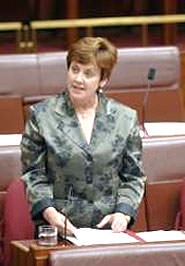 I'm sure I was not alone in waking up on Sunday morning after the election with a new sense of optimism about this country and our future. Australians have clearly voted for a future in which fairness and responsibility will be our guiding principles. I am proud to be a part of the Government that is going to carry out this agenda of making Australia a better and fairer place to live.
I'm sure I was not alone in waking up on Sunday morning after the election with a new sense of optimism about this country and our future. Australians have clearly voted for a future in which fairness and responsibility will be our guiding principles. I am proud to be a part of the Government that is going to carry out this agenda of making Australia a better and fairer place to live.
On Monday I was sworn in with the rest of the Labor Government's new Ministry, as Parliamentary Secretary for Social Inclusion and the Voluntary Sector. I am so pleased to be able to work on this area of policy: it is new, it is innovative, and it covers a range of issues that are close to my heart.
Social inclusion goes to the heart of what we are as a society and what our job as a Government might be. How do we make sure that people don't fall through the cracks? How do we make a tangible difference to people facing entrenched disadvantage? How do we change things so that all Australians, regardless of where they live or who they are, can participate in the social and economic life of the nation? And how do we expand our notion of the national community so that more people can feel included within it?
Labor has adopted social inclusion as an objective and organising principle of the nation's social and economic policy. Social inclusion is about recognising that economic prosperity in and of itself is not enough: it is central to the work of government to make sure that this prosperity leaves no-one behind. We need to think about disadvantage in terms of its effects — how it prevents people from participating and living full lives — so as to understand how best to address it.
International experience shows that a targeted, coordinated and assertive approach is needed to tackle social and economic disadvantage. The approaches that have been successful overseas have focused on re-engagement and social and economic participation as a means of overcoming such disadvantage.
In working to address social exclusion, we will also look to support effective, community-driven solutions to local problems. We will work across portfolios and across levels of government, and we will actively seek input from, and partnerships with, communities, business and nonprofit organisations.
Bringing economic and social policy together to reduce disadvantage is going to take a massive effort of cooperation between the Commonwealth, the States and the not-for-profit sector. But with a sense of realism, we can make huge inroads into disadvantage. New advisory and policy coordination bodies will be needed to guide it. Ours is the first government in Australia to ever have a Minister for Social Inclusion.
One of the first things we will do is to establish a Social Inclusion Board that will lead consultation in the community, listening to leading welfare advocates, economists and policy specialists.
Its task will be to advise the Government on what, how and where our major social investment efforts must begin, feeding into the operations of a new Social Inclusion Unit in the Prime Minister's Department.
As well as being Parliamentary Secretary for Social Inclusion, I am also responsible for the Voluntary Sector. This is a recognition at the outset from this Government of the importance of the voluntary, community and not-for-profit sector in creating social inclusion in Australia, and in making Australia a better place to live.
This sector employs 700,000 Australians, has a turnover of some $50 billion and involves 5.5 million volunteers. These organisations provide ways for Australians to participate in the broader community. They are often the glue that holds communities together: whether protecting a local bushland or supporting a junior soccer competition.
They are also addressing entrenched disadvantage, and driving innovative, on-the-ground solutions to issues such as helping people with a disability find and stay in employment or delivering health services to remote indigenous communities.
This sector strengthens our civil society and the wider community through contributing to public debate, facilitating community engagement and as both a creator and product of social capital.
I have spoken to many people working and volunteering in this sector over the past few years and I am continually inspired by their hard work and their commitment to helping others. Our Government is committing to strengthening this sector, enabling it to do its work more effectively, and protecting the right of these organisations to advocate and participate in public debate.
Eureka Street's editor asked me what 'social inclusion' has to do with social conscience. I think it's clear that they have a great deal to do with one another. Social inclusion seems to me to be about implementing social conscience in the work of government. It's all very well to want Australia to be fairer, to help those who are disadvantaged. Our social inclusion agenda is perhaps a little more hard-headed than that. We want to make it happen.
It is early days of course, but hopes are high and there is much goodwill. Working with a team full of dedicated, hard-working and determined people, I am optimistic about the difference we can make.
.jpg) Dr Ursula Stephens is a Labor Senator for NSW and Parliamentary Secretary for Social Inclusion and the Voluntary Sector.
Dr Ursula Stephens is a Labor Senator for NSW and Parliamentary Secretary for Social Inclusion and the Voluntary Sector.